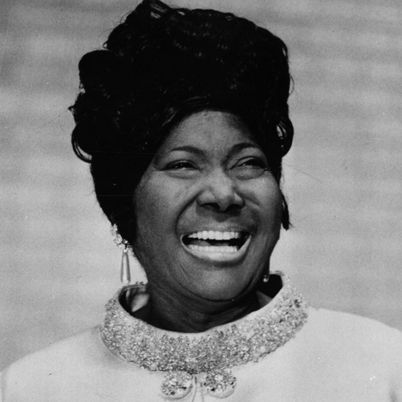 In the early 1950s, Mahalia Jackson found herself before a sellout crowd in New York City’s famed Carnegie Hall. “I stood there,” she later recalled, “gazing out at thousands of men and women who had come to hear me – a baby nurse and a washerwoman – on the stage where great artists like Caruso and Lily Pons and Marian Anderson had sung, and I was afraid I wouldn’t be able to make a sound.” But sing, she did, and “The more I sang, the more people in the audience cried out for joy. As the beat picked up, hands started flying, and feet started tapping, and folks began to shout all over the Great Hall.”
In the early 1950s, Mahalia Jackson found herself before a sellout crowd in New York City’s famed Carnegie Hall. “I stood there,” she later recalled, “gazing out at thousands of men and women who had come to hear me – a baby nurse and a washerwoman – on the stage where great artists like Caruso and Lily Pons and Marian Anderson had sung, and I was afraid I wouldn’t be able to make a sound.” But sing, she did, and “The more I sang, the more people in the audience cried out for joy. As the beat picked up, hands started flying, and feet started tapping, and folks began to shout all over the Great Hall.”
Jackson had risen from humble beginnings in New Orleans to become hailed as the world’s greatest gospel singer – the “Queen of gospel music.”
Mahalia’s formal education ended abruptly in the eighth grade when she took a job as a laundress. In 1928, although only 16, Mahalia moved to Chicago, where she lived with two of her aunts. Her plans to study nursing were dashed when one of her aunts became ill, making it necessary for Mahalia to work to help make ends meet.
In 1932, the untrained Mahalia paid a hard-earned 4 dollars to her professor on Chicago’s Southside – for what turned out to be her one and only singing lesson. The professor berated his would-be pupil, telling her to “stop hollering” and sing her songs “so that white people can understand them.”
Mahalia never went back for another lesson.
Gradually, Mahalia’s musical talent was noticed outside religious circles. Jazz promoters invited her to sing in nightclubs, with one promising her as much as $25,000 per night to perform in Las Vegas. Consistently, she turned down all such engagements, insisting that she was first and foremost a gospel singer. “When you sing gospel songs, you have a feeling that there is a cure for what is wrong,” she said. But “when you get through with the blues, you’ve got nothing to rest on.”
In 1972, Mahalia died in Evergreen Park, Illinois. At the Greater Salem Baptist Church, more than 40,000 people filed past her coffin to pay their final respects.
Because such a large crowd was expected, her funeral service was held at Chicago’s McCormick Place Convention Center.
Although Mahalia received accolades from around the world, she always maintained a deep sense of humility about herself and her gifts, saying, “My success is the work of the Lord.”